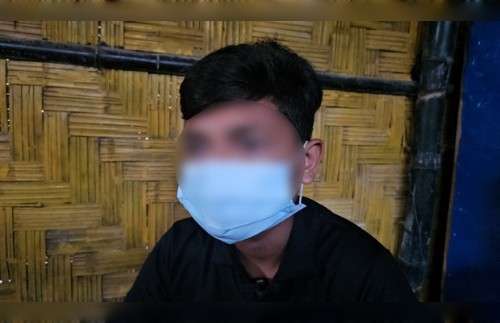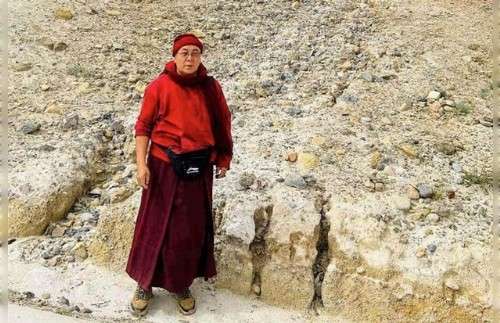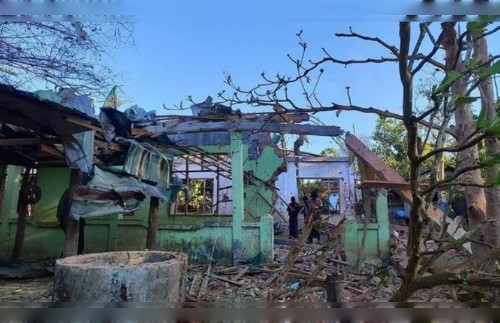The United Nations is demanding unfettered access to internment camps in northwest China’s Xinjiang Uyghur Autonomous Region (XUAR) after Beijing’s envoy invited U.N. human rights chief Michele Bachelet to “see for herself” what he called “education training centers” in the region.

In an emailed statement on Friday, the Office of the United Nations High Commissioner for Human Rights (OHCHR) confirmed to RFA’s Uyghur Service that Bachelet had received an invitation to visit the XUAR, but suggested she would not accept unless given access to the camps on her own terms.
“The High Commissioner has been invited to visit China and we are continuing to discuss with the Government for full access,” said OHCHR spokesperson Marta Hurtado.
“We can also confirm that she met with China’s ambassador to the United Nations in Geneva this week.”
On Thursday, Chen Xu, China’s ambassador to the United Nations in Geneva, told reporters that he hoped to find “a time which is convenient to both sides” for Bachelet to visit the XUAR, where up to 1.5 million Uyghurs and other Muslim ethnic minorities accused of harboring “strong religious views” and “politically incorrect” ideas have been held in a vast network of internment camps since April 2017.
He denied reports of mass incarcerations in the region, saying that “what is happening in Xinjiang is education training centers to help young people, especially young people, to get skills, to be well-equipped for their reintegration into society,” according to a report by Reuters news agency, adding that Bachelet should “see for herself … [that] there are no so-called re-education camps.”
Bachelet accepts a trip to the XUAR, she would become the highest level U.N. official to visit the region.
Bachelet, the former president of Chile who succeeded Prince Zeid Ra’ad al-Hussein of Jordan as the U.N.’s human rights czar in August last year, has repeatedly urged China to allow the United Nations to investigate reports of mass detentions of Muslims in the XUAR.
In January, China’s foreign ministry welcomed U.N. officials to visit the region, provided they “abide by Chinese law and comply with relevant procedures,” and “avoid interfering in domestic matters or undermining [China’s] sovereignty.”
Al-Hussein had previously warned that a government-controlled tour of the XUAR would offer little insight into the true conditions at the camps, particularly if U.N. officials are refused permission to interview detainees.
Thursday’s invitation comes as Vladimir Voronkov, the U.N.’s under-secretary general for counter-terrorism, is traveling in China on a week-long official visit.
Reports suggest that Voronkov plans to visit the XUAR, but a spokesperson for the U.N. would not confirm the details of his itinerary, and a Chinese foreign ministry spokesperson refused to comment on the claims.
Voronkov’s potential trip to XUAR has drawn criticism from international rights groups who say that sending him risks lending credence to China’s claims that detentions in the region are related to a counterterrorism issue, rather than a violation of human rights, and that his trip could be used as propaganda by Beijing to undermine a possible visit by Bachelet.
‘Insincere at best’
Rights groups greeted news of Chen Xu’s invitation to Bachelet with skepticism.
In a post to Twitter on Thursday, New York-based Human Rights Watch’s China director Sophie Richardson suggested that Chen Xu’s invitation was part of a bid by China to counter criticism of its rights record in the XUAR in the lead up to the 41st session of the U.N.’s Human Rights Council, planned for June 24 to July 12.
Gosh, what a coincidence—to repeat this hollow offer just ahead of #UN #HRC41,” she wrote.
Dolkun Isa, president of the Munich-based World Uyghur Congress, called the invitation “insincere at best,” adding that if Beijing had nothing to hide in the XUAR, it “would have invited [Bachelet] to visit a long time ago.”
He echoed Richardson’s claim that China’s invitation is an attempt to deflect international scrutiny of its camps in the XUAR ahead of the Human Rights Council session next week.
“China understands that human rights watchdogs and many governments will criticize its Uyghur concentration camps and urge it to close them down,” Isa told RFA.
“Therefore, this invitation is a preemptive measure to blunt any U.N. and state criticism of China’s crimes against humanity in East Turkestan,” he said, using a name preferred by many Uyghurs to refer to their historic homeland.
Isa also warned that China’s government would try to place “preconditions” on any visit by Bachelet in such a way to “only allow her to visit Potemkin camps on guided tours,” and that if she accepts, Beijing will use the trip to claim that the U.N. endorses its policies in the XUAR.
“A visit is worth it only if China unconditionally allows an independent U.N. fact-finding mission to visit East Turkestan with unfettered access to all camps, all detainees, and to speak with any detainees and officials they want,” he said.
“Otherwise, this visit will only be used by China to deceive the international community and to justify its crimes against humanity in East Turkestan committed upon the Uyghur people.”
Recent visits
China recently organized two visits to monitor internment camps in the XUAR—one for a small group of foreign journalists, and another for diplomats from non-Western countries, including Russia, Indonesia, Kazakhstan, and Thailand—during which officials dismissed claims about mistreatment and poor conditions in the facilities as “slanderous lies.”
Reporting by RFA’s Uyghur Service and other media organizations, however, has shown that those in the camps are detained against their will and subjected to political indoctrination, routinely face rough treatment at the hands of their overseers, and endure poor diets and unhygienic conditions in the often overcrowded facilities.
In May, U.S. Secretary of State Mike Pompeo, in an apparent reference to the policies of Hitler’s Germany and Stalin’s Soviet Union, cited “massive human rights violations in Xinjiang where over a million people are being held in a humanitarian crisis that is the scale of what took place in the 1930s.”
Last week, U.S. Ambassador-at-Large for International Religious Freedom Sam Brownback told RFA’s Uyghur Service in an interview that countries around the world must speak out on the Uyghur camps, or risk emboldening China and other authoritarian regimes.
“The Muslim countries should do that. The Western world, the entire world, should do this and condemn these sort of internment camps, of over a million people interned in the year 2019, and they are interned primarily because of their faith and the practice of their faith,” he said.
The U.S. Congress has also joined in efforts to halt the incarcerations, debating legislation that seeks accountability for China’s harsh crackdown on the Uyghurs. The Uyghur Human Rights Policy Act would appoint a special State Department coordinator on Xinjiang and require regular reports on the camps, the surveillance network and the security threats posed by the crackdown.
Reported and translated by Alim Seytoff for RFA’s Uyghur Service. Written in English by Joshua Lipes
Copyright © 1998-2016, RFA. Used with the permission of Radio Free Asia, 2025 M St. NW, Suite 300, Washington DC 20036. https://www.rfa.org
















